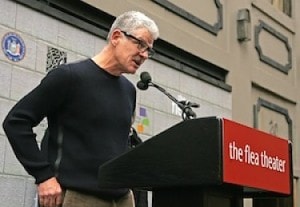
NEW YORK CITY: The announcement last week that Jim Simpson, founding artistic of the Flea Theater, would step down after 17 years of running the Off-Off-Broadway mainstay may have seemed a surprise to many, for whom Simpson was the Flea. But transition is something he had on his mind almost from the start of the resilient company, which he founded in a building on White St. in lower Manhattan with $1 million of his wife Sigourney Weaver’s movie money.
“I thought five years would be the correct amount,” Simpson said in a recent interview. Now, after nearly two decades at the helm, his plans to leave coincide with the Flea’s plans to purchase a nearby building and turn it into a three-theatre complex to the tune of $18.5 million. Wouldn’t this be a great time to stick around and manage the move? On the contrary, Simpson said.
“I really began to think about: What would I want as a new leader?” he said. “I realized, if I were the new leader, I actually would like to open the new building.” Referring to his track record at the Flea of giving early-career chances to writers and performers, Simpson continued, “I’ve had no little success offering opportunity to other people, so it’s a natural thing to want to do that with leadership, as well.”
The new artistic director, for whom a formal search has begun, will assume the post at the end of the current 2014–15 season, roughly a year before the new building is slated to open. So they’ll spend a year at the company’s current location “to get an idea of how we roll, to see how it works at those two little theatres,” Simpson said, before shepherding the move to the new space.
And it’s not like Simpson is leaving with the job half-done. “We’re 95 percent there in terms of funding” for the new building, thanks to a “very big donation from the Ford Foundation,” he said. Citing the board’s strength, and the continuing leadership of managing director Carol Ostrow, Simpson feels he’ll be leaving the Flea “at a high point.”
He won’t be fleeing the Flea entirely, of course; he’ll stay on in an advisory role to whatever extent the new leader requires. For now, though, he’s less interested in giving an “exit interview” than in getting the word out about the job opening.
“I really want to beat the bushes and find out who’s the next young leader who loves Off-Off Broadway and who sees the potential power of this tiny little theatre,” Simpson said. “It’s a singular opportunity for a young leader to come and really make a splash.” He’s open to the idea that the right candidate may not even be a director. “It could be someone who’s more administrative, and is interested in the idea of programming three theatres.”
Regarding one of the more controversial programs at the Flea—the unpaid, all-volunteer “Bats” company, which has offered an opportunity both for early-career actors to hone their stage skills, and for the Flea to mount large-cast shows with minuscule labor costs—Simpson said the new a.d. would be expected to share what he called “a commitment to young people.” The Bats volunteer program is “a fundamental part of our identity; it’s legal, it’s vital and it’s worth supporting.” He said it had evolved over the years in response to a need for “an open door for young actors to come in and do their thing,” and has become, in his words, “a way to serve a lot of young people at a really high level.”
If the Flea’s particular version of the downtown aesthetic has been hard to pin down, that’s in part because, as Simpson put it, the company “serves three constituencies: young artists, basically pre-professional, who come here to get their chops together and work in front of an audience. In the middle are outside groups that do work here, whether full productions or readings: the dance company LAVA, the Play Company—groups that have been around for a while but who bounce from rental to rental. The last group are writers like A.R. Gurney or Hamish Linklater—established artists who come to the Flea to experiment.”
Gurney, who has credited the Flea with revivifying his playwriting career, is also a resident playwright uptown at the Signature Theater, where Simpson will soon direct his What I Did Last Summer. “I’m looking forward to working on a stage that’s larger than 24 by 20 feet,” Simpson said. More broadly, he said he was relishing “the idea of being a ronin for a while, a masterless samurai.”
Still, in his years at the Flea, Simpson said, “I’ve developed a really big respect for people who have committed to an institution. I used to look at them askance, but now I have a really high regard for those who do.”


